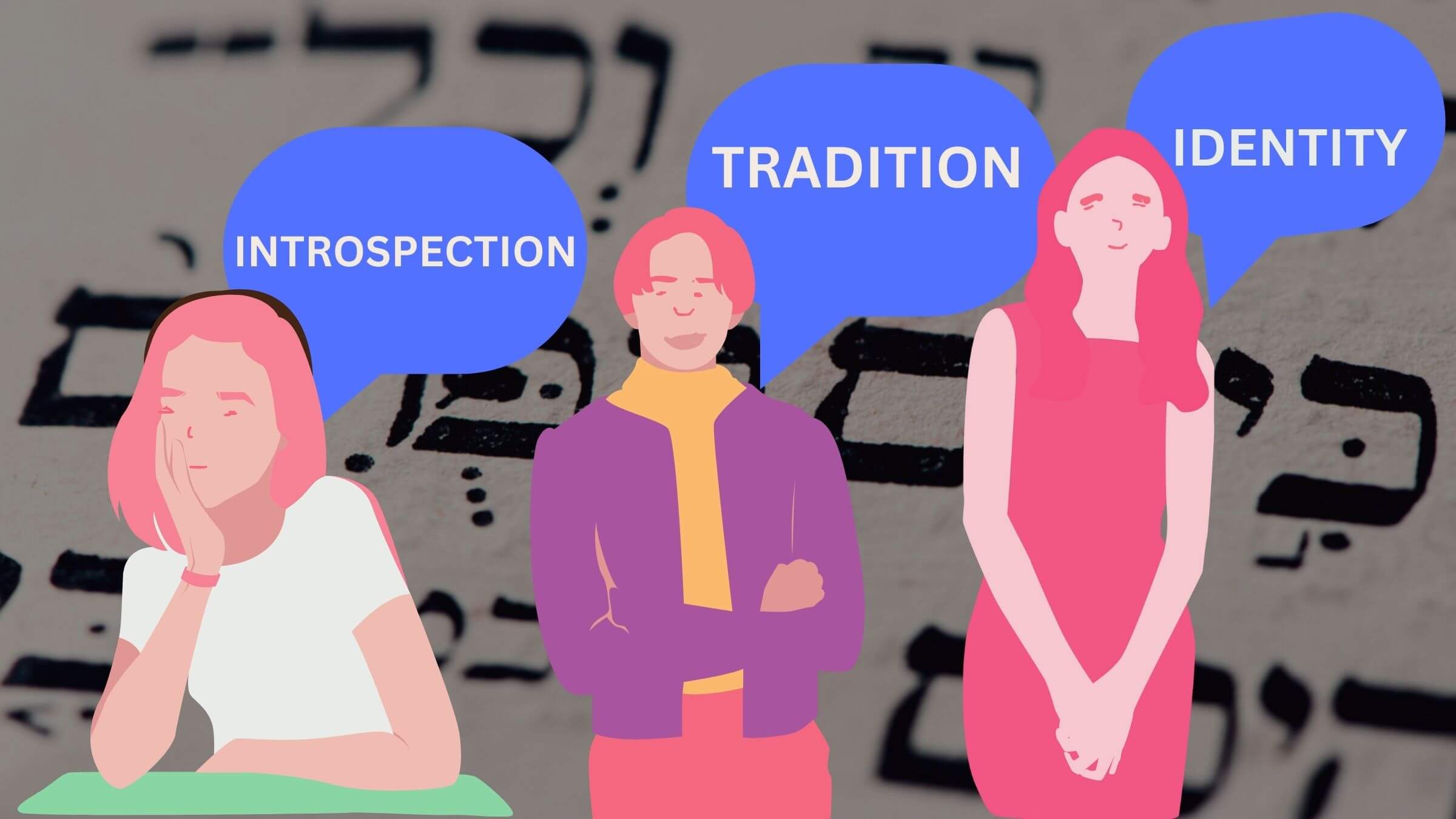FIRST PERSONI fast on Yom Kippur but don’t go to synagogue. And there are many Jews like me
Here’s why we fast on Yom Kippur, the holiest day of the Jewish calendar — but we don’t pray, repent or ask forgiveness

Some Jews fast on Yom Kippur, but their observance doesn’t include prayer or going to synagogue. Illustration by Beth Harpaz/Canva
For years I’ve fasted on Yom Kippur, sundown to sundown. But I don’t pray, go to services or ask forgiveness.
When I worked in a 24/7 newsroom, I even went into the office. I wouldn’t have had the energy to run a 5K. But I could work on a computer.
Sometimes on Rosh Hashanah (when I also don’t go to synagogue), I read the famous passage from the machzor that says you won’t be inscribed in the Book of Life if you don’t repent before Yom Kippur. That repentance determines “who shall live and who shall die.” For a moment, I worry about all the terrible ways in which I might perish — “who by water, who by fire.” (Even worse, who dies “serenely” vs. who dies “tormented.”) Then I remind myself that I don’t believe in God (or at least, I have a lot of questions), and the worry passes.
Without religion, are there still rules?

Despite my own lack of religion, I get judgey with people whose approach to the holiday differs from mine. I was shocked to learn that some people only fast during the day instead of starting the evening before. What kind of sacrifice is that?
Some even drink water or coffee. One woman justifies the coffee by not putting milk in it. She says it’s OK because she won’t enjoy it black. The commandment from Leviticus for Yom Kippur says, “You shall afflict yourselves.” So maybe coffee without milk qualifies as an affliction? Which reminds me of the one recent Yom Kippur when I didn’t fast, in 2020, when the pandemic began. My reasoning: I’d suffered enough.
Then there are people who do the opposite: They go to shul but don’t fast. Sure, you get dispensation for illness, pregnancy, old age, etc. But some people just don’t want to feel hungry — just like I don’t want to pray. So whose hack is more sacrilegious — mine, taking God out of the equation? Or theirs, praying while breaking the other rules?>
“Each person is observing in their way, in their choice,” a nice friend reminded me.
Readers weigh in
I wondered if I was alone in doing it my way — fasting without God. So I crowdsourced and asked to hear from Forward readers. I expected a couple of responses. Instead, I got dozens. They fell into three categories: people who reject synagogue outright; people who embrace the holiday as an opportunity for introspection — but at home, and outside the formal dictates of religious practice; and people who see fasting as a ritual that connects them with their identity.
I wasn’t sure any of those explanations applied to me — but more on that later.
Synagogue? No thanks
Many readers, like Susan Brumer, fast as a way “to recognize the gravity of the day,” but they don’t find synagogue services meaningful. “I also dislike that there are too many folks who only attend on those three days and do not want to be part of that,” she said.
David Greenberg similarly feels “alienated” from the synagogue-going part of Yom Kippur. But fasting is a way of honoring and remembering his ancestors, “a way of keeping my connection to the larger group and the tradition itself.” He mentioned a principle cited by other readers: “Fasting and not working on Yom Kippur and Rosh Hashanah are also ways of supporting our right, despite being a small minority in the United States, to observe our holidays just as the majority group does.”
Beth Becker agreed. “I usually fast, as a reset and in solidarity, and never work or go places, because the non-Jewish world is too eager to point to the one Jew who doesn’t practice to justify taking away rights/benefits from the whole community.” She doesn’t go to shul or pray, “but I do think about who I may have wronged and how I can be better, and try to do teshuvah” (repentance).

Esther Bergdahl has yet to find a synagogue in Chicago that’s as haimish as the tiny, tightknit Jewish community she had growing up in Appalachia. But she fasts on Yom Kippur, without going to services, because “I still want to be part of things while I’m figuring out where I fit.” She’ll spend the day checking in with Jewish friends on Discord and taking a walk by Lake Michigan.
Morris Weinner fasts but lost the habit of going to synagogue during the pandemic and is “not sure when or if I’ll return. I find I’m not inspired to even watch services streaming, let alone go in person.” So why fast at all? “Tradition!”
Introspection
Judy Herzfeld fasts at home, without going to synagogue, to set a “contemplative mood uninterrupted by food prep, eating or clean up.” She also does “a bit of reading in the machzor, not in the literal manner of pleading, but rather in taking inspiration and resolve from the poetry of centuries past.”
Marvin Fishman also fasts, but does not pray, “in contemplation and introspection, evaluating my behavior and attitude toward others during the past year.”
A neighbor told me she fasts without prayer because “the hunger pangs do give me a prompt to remember to reflect.” When her kids were little, she’d sit them in a park meadow to think “for a bit about how to be a better person.”
Jeanine Meyer uses the day for reflection and tashlich — the symbolic casting away of sins, usually done on Rosh Hashanah — “to shake off bad thoughts, grudges, memories.”
Jacqueline Wolf wrote from France to explain that she doesn’t go to shul or pray, but she fasts, meditates and works on “angers or hurts, knowing that my family around the world is also respecting that day.”
Amy Livingston engages in a different type of fasting: “I now spend 24 hours, from sundown to sundown, fasting from the internet. For me, this feels much more cleansing than abstaining from food.”
Fasting as a ritual
Susan Schneir said fasting affirms her identity. “I don’t believe in God, but love my Jewish heritage and how it connects me to my family and our history,” she wrote.
“There’s comfort in knowing that we have our rituals, our places and at the end of that day, family to be with,” agreed Suri Weinberg-Linsky, writing from Toronto.
Elaine Slater won’t fast this year — but only because she’s 98 and her children insist that she stop. But she always fasted in the past because “I identify strongly as a Jew.”
A friend of mine who fasts without going to temple says the holiday for her “is much more about tradition and in my own weird way honoring my grandparents.” But because she doesn’t go to synagogue, she’s never skipped work: “I always felt that was cheating.”
Henry Shields, meanwhile, pays tribute to his family by not fasting: “My Litvak family in Lithuania were murdered on Yom Kippur in 1941 and YK has become unbearable for me. So, I ‘cancel’ it.”
The ‘break-fast’
I’ve always wondered how those who fast for 24 hours have the energy to organize a break-fast, even if only bagels and lox. I barely have the energy to warm up leftovers. (And I suspect that historically, this has been a challenge more often shouldered by women as the default meal-makers in many families.)

One reader told me she fasts but doesn’t go to shul “because I’m home preparing the break-fast.” In the late afternoon, she says kaddish for her parents and grandparents, then waits for the rest of the family “to come home so I could feed them.”
She added: “I fast because, why not? It’s good to honor the traditions even if I don’t show up in person. Fasting means I’m Jewish and I honor that.”
But there are also Jews who “break the fast” with friends who’ve neither prayed nor fasted. (This is big in Palm Beach, trust me.) I grudgingly admire any excuse to eat and socialize: What could be more Jewish?
My sister says she breaks “the fast that I haven’t fasted for as part of acknowledging a Jewish tradition and special day.” As a yoga teacher, she also brings the philosophical aspects of atonement, forgiveness and soul-searching to her students. “I believe we can search our souls just as well, if not better, without the intrusive thoughts created by hunger,” she added.
The real reason, revealed
All these explanations — tradition, introspection, asserting our rights as a religious minority — were interesting. But none seemed to fit me. A friend wondered if I fasted to support my husband, the way a non-Jewish friend fasted in solidarity with her daughter.
Nah — I’m not that kind of wife.
Then I asked my husband about it. He observes Yom Kippur like I do — fasting without God. Neither of us grew up with fasting as a family tradition. His father was an Israeli whose sole religion was Zionism, a man who pointedly ate bacon and eggs on Yom Kippur. (Isaac Bashevis Singer’s characters also transgressed on Yom Kippur: One ate pork, another committed adultery.) My father, a secular Jew, also didn’t fast on Yom Kippur. He did stay home from work, though — but only because he worked in the Garment District and everything was closed.
My husband fasts partly for the pure physical challenge and partly out of some lingering sense of religion. We belonged to a synagogue for years but our membership lapsed after our sons’ bar mitzvahs. Despite letting go of our connection to institutional Judaism, I kept hosting Hanukkah parties and seders, and my husband kept fasting on Yom Kippur. At some point long ago in our 35-year marriage, I joined him.
Did he remember why I started? Without hesitation, he said: “To compete with me.”
Bingo! I realized that was it. After all, every day, he and I compete to see who does better at Wordle and Connections. We compare our step counts and tease each other about who’s ahead in the endless quest to lose a few pounds.
So there it is, ugly but true: I fast on Yom Kippur to show my husband he’s not the only one who can do it.
May the God I don’t believe in please forgive me.






















